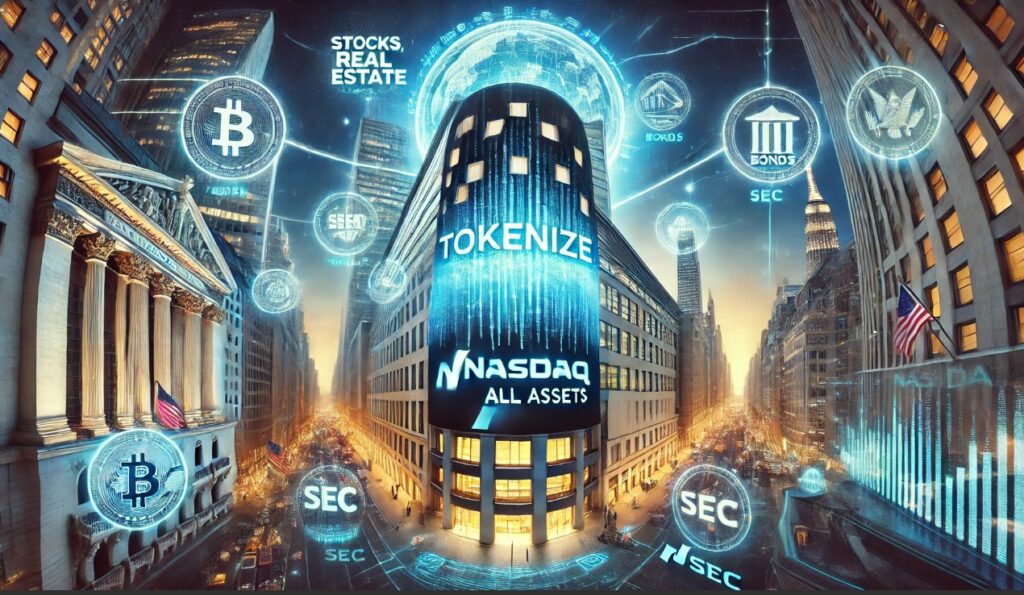The landscape of the financial world is undergoing a transformation with the integration of blockchain technology and tokenization. As major players like BlackRock continue to drive growth in this innovative space, traditional financial institutions are poised to harness these advancements. Among them, the Nasdaq stands out with its strategic vision, aiming to revolutionize the trading of securities by incorporating digital asset technology. This forward-thinking approach not only promises to enhance efficiency but also signifies a shift toward a more modern financial ecosystem.
Nasdaq’s Strategic Push Towards Tokenized Securities
Embracing Blockchain for Financial Advancement
In a compelling discussion, Tal Cohen, President of Nasdaq, highlighted the immense potential of merging tokenization with existing market infrastructures. According to him, this synergy could greatly benefit issuers, investors, and the economy by streamlining transactions, accelerating settlements, automating processes, and improving capital management. Cohen also emphasized the transformative role of blockchain technology in reshaping financial operations, such as modernizing proxy voting and innovating corporate actions management.
To facilitate this transformation, Nasdaq has submitted a proposal to the US Securities and Exchange Commission (SEC) to allow the trading of tokenized securities on its platform. This initiative reflects Nasdaq’s commitment to integrating blockchain technology responsibly into the US equities market, potentially setting a new standard for trading efficiency and security.
Regulatory Milestones and Industry Interest
The proposal from Nasdaq marks a significant milestone, as it could become the first instance where tokenized securities are traded on a major US stock exchange if approved by the SEC. This move underscores a broader industry trend, with other major players like Coinbase, Bank of America, and Citi also exploring the possibilities of tokenized assets.
Once Nasdaq implements its proposal and the necessary infrastructure is established, investors will have the opportunity to engage in token-settled trades, further streamlining market processes and enhancing trust. This anticipated evolution is expected to occur around late 2026, contingent on the readiness of the Depository Trust Company’s infrastructure.
Projected Market Changes and Industry Insights
The integration of tokenized securities into mainstream financial markets is expected to have far-reaching impacts. It promises to not only enhance transactional efficiency but also potentially increase market participation by lowering barriers and introducing new financial products. The role of such innovations in decentralized finance (DeFi) demonstrates how traditional financial services like lending and trading can be reimagined to deliver more value.
However, such advancements bring along inherent risks. Cohen cautions that maintaining governance and ensuring investor protection from the onset is crucial to ensuring that the benefits of these innovations are fully realized.
Frequently Asked Questions (FAQs)
What Are Tokenized Securities?
Tokenized securities represent traditional financial securities, such as stocks or bonds, in a digital form on a blockchain. This digital representation facilitates faster and more secure transactions while enabling new features like fractional ownership.
How Does Blockchain Improve the Trading Process?
Blockchain technology enhances the trading process by providing a transparent, secure, and efficient means of conducting transactions. It reduces the need for intermediaries, speeds up settlement times, and potentially lowers transaction costs.
What Challenges Do Tokenized Securities Face?
Despite their potential, tokenized securities face regulatory hurdles, technological integration challenges, and the necessity of maintaining investor protections. Addressing these concerns is essential for widespread adoption.
Is the Adoption of Tokenized Securities Expected to Grow?
The adoption of tokenized securities is anticipated to grow as more financial institutions and regulatory bodies recognize their potential benefits. However, their success hinges on the resolution of regulatory and infrastructural challenges.
This comprehensive guide sheds light on the evolving landscape of tokenized securities, offering readers insights into the technological advancements, regulatory considerations, and the future potential of these digital assets. Through a careful exploration of these topics, we provide the knowledge necessary for informed financial decisions.

